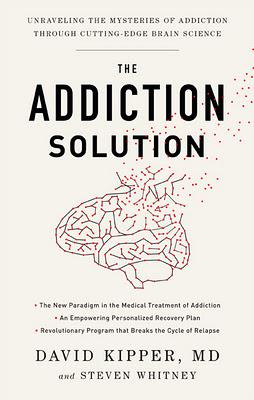
Raw carrots won’t cut it.
How times have changed. You’ve heard of Rodale, the outfit that kicked off organic gardening in America, and publishes Prevention Magazine and Organic Gardening? Founded in 1947, the Rodale Institute’s mandate was to publicize J.I. Rodale’s personal vision of healthy soil and healthy food. So it was with great astonishment that I picked up The Addiction Solution: Unraveling the Mysteries of Addiction Through Cutting-Edge Brain Science, published by Rodale Books, heretofore famous for such perennials best sellers as The Rodale Book of Composting, The Rodale Whole Foods Cookbook, Diabetes Without Drugs, and The Organic Manifesto.
So what is the approach taken in this new paperback about addiction? Herbal treatments for alcoholism? Fresh air and sunshine for meth addiction? No. The “brain science” in the subtitle is really just that. Written by Dr. David Kipper, a Beverly Hills physician, and Steven Whitney, a former addict, the book states that addiction is… er… a brain disease, and not primarily a behavioral issue. It seems that Big Science has gotten its murderous dissecting hands around the Rodale organization at last. In neuroscience, not organic carrots, lies the future of addiction treatment, the book asserts. Is old man Rodale turning over in his grave? It gets worse. The Rodale organization is now saying, through this book, that if you are an addict, you might want to consider taking… more drugs.
Here it is, in a nutshell: “An inherited genetic flaw causes specific imbalances in brain chemistry, that, when impacted by stress, create biochemical ‘wantings,’ or needs, that show themselves as bad feelings, uncharacteristic behaviors, and/or addiction, which is medically treated by a new family of pharmaceutical medications that first regain and then stabilize the biochemical balance. During the rehabilitation of the brain chemistry, the patient enters a personalized recovery program featuring behavioral and other therapies.”
You can argue with certain specifics in that definition—“brain imbalance,” for example, is falling out of favor as a descriptor—but there is no denying that it represents an attempt at a strictly neurophysical definition of the condition.
Traditional addiction treatment, the book argues, hasn’t included any of this. The authors maintain that “traditional 28-day inpatient programs at treatment centers are now largely unnecessary. This is good news, since that kind of treatment costs from $50,000 to $100,000 per month.” [Editor’s note: perhaps in Beverly Hills.]
“In contrast,” the authors write, “the new medical paradigm is grounded in outpatient treatment, making it more affordable, especially with insurance and government benefits that define addiction as a medical disease. Thanks to the Mental Health Parity and Addiction Equity Act of 2008, insurers that offer substance abuse coverage must provide the same lifetime limits on payment as they provide for other medical diseases like diabetes, heart disease, and cancer.”
And what does all this accomplish? “More subtly, the new approach replaces the expectation of failure attached to the old, traditional treatment with a tangible opportunity for success, including raising an addict’s self-esteem.” Away with your old and traditional ways, says this Rodale title. If you are looking for an organic alternative to what is becoming the mainstream view of addiction, you will have to look elsewhere. Perhaps Prevention magazine might have something more in your line.
Graphics Credit: http://metalmother.com/

